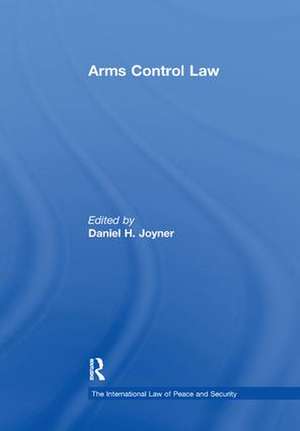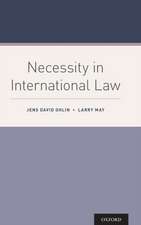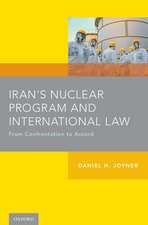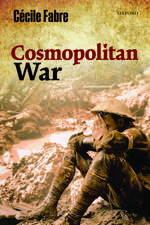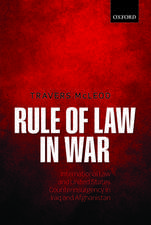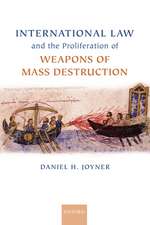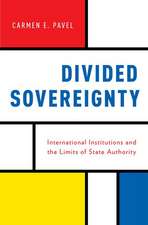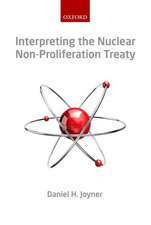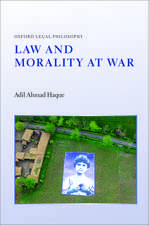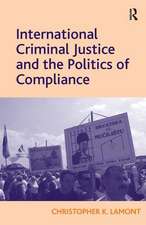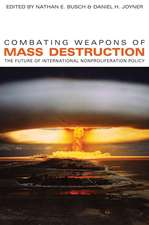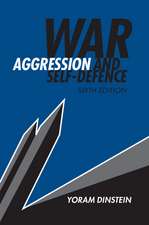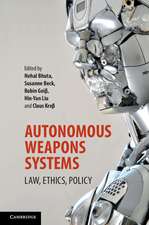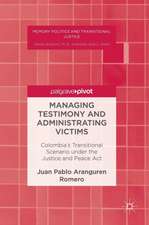Arms Control Law: The International Law of Peace and Security
Editat de Daniel H. Joyneren Limba Engleză Paperback – 12 iun 2019
| Toate formatele și edițiile | Preț | Express |
|---|---|---|
| Paperback (1) | 314.32 lei 6-8 săpt. | |
| Taylor & Francis – 12 iun 2019 | 314.32 lei 6-8 săpt. | |
| Hardback (1) | 1700.28 lei 6-8 săpt. | |
| Taylor & Francis – 28 feb 2012 | 1700.28 lei 6-8 săpt. |
Preț: 314.32 lei
Preț vechi: 364.11 lei
-14% Nou
Puncte Express: 471
Preț estimativ în valută:
60.15€ • 65.32$ • 50.53£
60.15€ • 65.32$ • 50.53£
Carte tipărită la comandă
Livrare economică 22 aprilie-06 mai
Preluare comenzi: 021 569.72.76
Specificații
ISBN-13: 9781138378667
ISBN-10: 1138378666
Pagini: 632
Dimensiuni: 169 x 244 mm
Greutate: 1.16 kg
Ediția:1
Editura: Taylor & Francis
Colecția Routledge
Seria The International Law of Peace and Security
Locul publicării:Oxford, United Kingdom
ISBN-10: 1138378666
Pagini: 632
Dimensiuni: 169 x 244 mm
Greutate: 1.16 kg
Ediția:1
Editura: Taylor & Francis
Colecția Routledge
Seria The International Law of Peace and Security
Locul publicării:Oxford, United Kingdom
Cuprins
Contents: Introduction; Part I Nonproliferation as a Normative System: The jurisprudence of non-proliferation: taking international law seriously, David A. Koplow; International law and weapons of mass destruction: end of the arms control approach?, David P. Fidler. Part II Nuclear Weapons: The treaty on non-proliferation of nuclear weapons: nuclear technology confronts world politics, Mason Willrich; The future of the NPT, John Simpson; Nuclear disarmament: how much have the five nuclear powers promised in the non-proliferation treaty?, George Bunn and Roland M. Timerbaev; The IAEA safeguards system, Laura Rockwood; The nuclear suppliers group: history and functioning, Daniel H. Joyner; Nuclear-weapon-free zones: a history and assessment, Jozef Goldblat; Something old, something new: the 2006 Semipalatinsk treaty on a nuclear weapon-free zone in Central Asia, Marco Roscini; Arms control law in crisis? A study of the North Korean nuclear issue, Masahiko Asada; Why less is more: law and policy considerations on the Iranian nuclear issue, Daniel H. Joyner. Part III Chemical and Biological Weapons: Chemical and biological weapons, Julian Perry Robinson; The Organization for the Prohibition of Chemical Weapons: moving closer towards an international arms control organization? A quantum leap in the institutional law of arms control, Eric P.J. Myjer; The shortcomings of indeterminacy in arms control regimes: the case of the Biological Weapons Convention, Jack M. Beard; CBW export controls: towards regime integration?, Alexander Kelle. Part IV Missiles: Emptying the haunted air: the current and future missile control regime, Scott Jones; The ABM Treaty: changed circumstances, extraordinary events, supreme interests and international law, Rein Müllerson. Part V The UN Security Council and Nonproliferation Law: Developments of the law of arms control as a result of the Iraq-Kuwait conflict, Dieter Fleck; Nuclear non-proliferation and the UN Security Council in a multipolar world: can international law protect states from the Security Council?, Daniel H. Joyner; Index.
Notă biografică
Daniel H. Joyner is Associate Professor of Law, University of Alabama, USA
Descriere
This volume features a selection of the best scholarship on international law as it is relevant to the proliferation of weapons of mass destruction. The essays consider the nonproliferation legal regime as a normative system and offer a more discrete consideration of international law in each weapons of mass destruction technology area. The role, authority and track record of the UN Security Council in this area are also evaluated.
